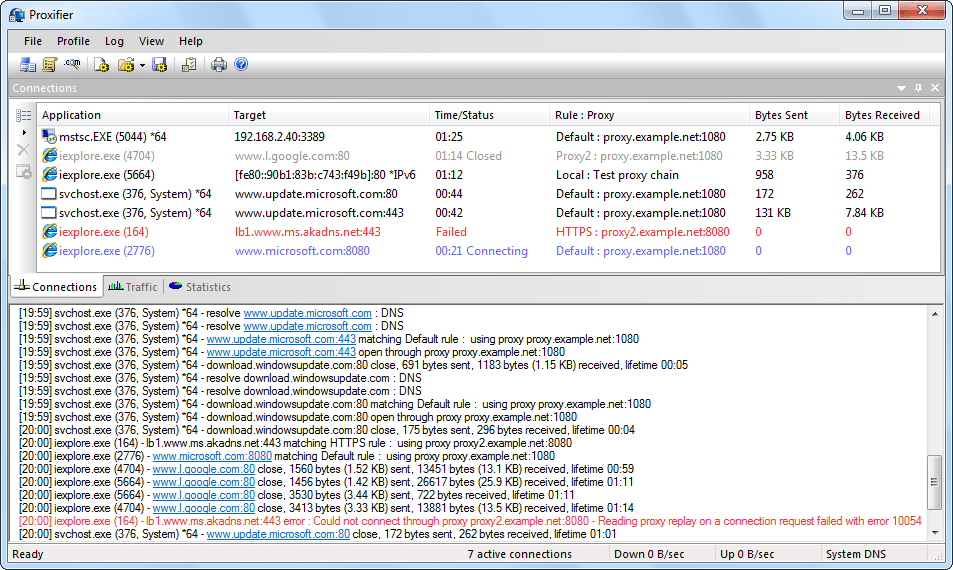Brief information about Proxifier
Proxifier is a software application that enables network applications that do not support working through proxy servers to operate through an HTTPS or SOCKS proxy or a chain of proxy servers. It is a vital tool for anyone seeking to maintain privacy, security, or bypass network restrictions, such as firewalls.
The History of the Origin of Proxifier and the First Mention of It
The concept of Proxifier was developed in the early 2000s to fill a gap in the network industry where some applications could not natively support proxy functionality. This led to a need for a program that could reroute network traffic through proxy servers, thus giving birth to Proxifier. The first commercial version of the software was released in 2004, addressing various compatibility issues and adding an extra layer of security to network communications.
Detailed Information about Proxifier: Expanding the Topic
Proxifier is more than just a rerouting tool; it’s a sophisticated software that provides granular control over network connections. Users can define rules based on application name, IP address, or port number to ensure that specific connections are sent through particular proxy servers. The program also supports various types of proxies, including SOCKS v4, v5, and HTTPS.
Features:
- Proxy rules with filters
- DNS through proxy
- HTTPS and SOCKS support
- Chain proxy servers
- Proxy server availability checking
- Traffic logging and monitoring
The Internal Structure of the Proxifier: How the Proxifier Works

Proxifier operates by intercepting and redirecting network connections made by a client application. It consists of three main components:
- Client Interface: Where users define rules and preferences.
- Connection Engine: This reroutes the connections according to user-defined rules.
- Proxy Servers List: This contains the information about various proxies to which connections can be rerouted.
The process:
- A user application initiates a connection.
- Proxifier intercepts this connection request.
- It then routes the request through the selected proxy server.
- The server connects to the target address, and the data flow is established through the proxy.
Analysis of the Key Features of Proxifier
- Versatility: It can be used with any application, even if it doesn’t natively support proxies.
- Security Enhancement: By routing through proxies, Proxifier can add encryption to insecure connections.
- Network Control: Users have granular control over how and where connections are made.
- Bypassing Restrictions: It can bypass network restrictions like firewalls and geo-blockades.
Types of Proxifier
Various versions and configurations of Proxifier exist to cater to different needs. Here’s a table summarizing some:
| Type | Description |
|---|---|
| Standard Edition | Basic version with essential features |
| Portable Edition | Designed for portable use, no installation needed |
| Professional Edition | Offers advanced functionalities and features |
Ways to Use Proxifier, Problems, and Their Solutions Related to Use
Ways to Use:
- Anonymizing Traffic: Hiding IP address and location.
- Bypassing Restrictions: Accessing content blocked by geographical or organizational restrictions.
- Enhancing Security: Routing traffic through secure proxy servers.
- Load Balancing: Distributing network load across multiple paths.
Problems and Solutions:
- Compatibility Issues: Updating to the latest version usually fixes these.
- Latency Issues: Proper selection of proxy servers can mitigate latency.
- Configuration Errors: Proper understanding and configuration are vital for optimal performance.
Main Characteristics and Other Comparisons with Similar Terms
| Feature | Proxifier | Similar Tools |
|---|---|---|
| Support Types | HTTPS, SOCKS | Varies |
| Compatibility | All applications | Limited |
| Security Options | Advanced | Basic |
| Customization | High | Moderate |
Perspectives and Technologies of the Future Related to Proxifier
The future of Proxifier looks promising with the increasing focus on privacy, security, and network flexibility. Emerging technologies like AI-based traffic analysis and blockchain for enhanced security can be integrated with Proxifier systems. These developments can pave the way for a new generation of Proxifier tools, even more, adaptable, secure, and user-friendly.
How Proxy Servers Can be Used or Associated with Proxifier
Proxy servers are the backbone of Proxifier’s functionality. They act as intermediaries, enabling Proxifier to reroute connections, maintain anonymity, and add security layers. This relationship allows for the full spectrum of proxy servers, like those offered by OneProxy, to be utilized for various purposes such as:
- Web scraping
- SEO monitoring
- Online gaming
- Streaming media
- Secure browsing
Related Links
- Proxifier Official Website
- OneProxy Services
- SOCKS Protocol Specification
- Internet Security Overview
The information presented in this article offers a comprehensive insight into Proxifier, its applications, functions, and future trends. It showcases how integral it can be for individuals and businesses looking to navigate the complex landscape of modern networking, privacy, and security. With services like those offered by OneProxy, the capabilities of Proxifier are further enhanced, providing robust and reliable solutions for various online activities.




